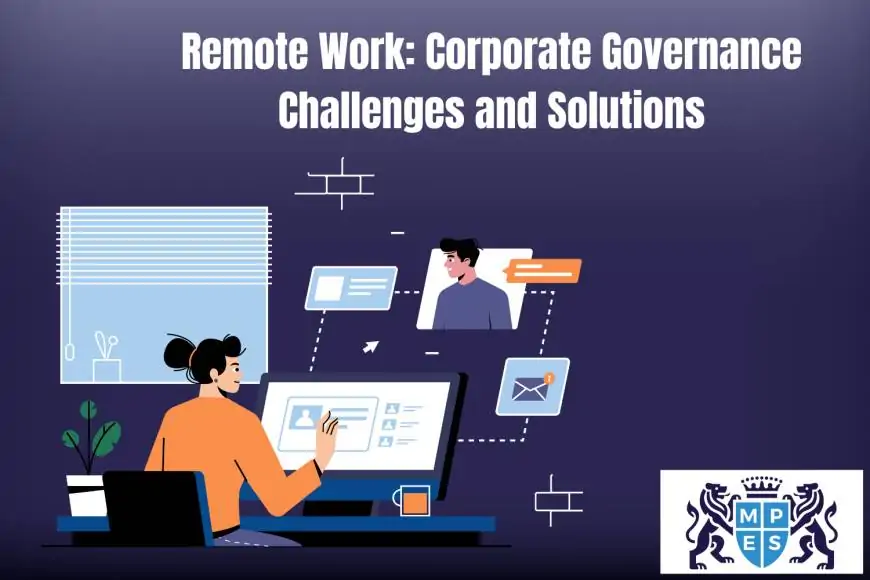Has remote work made corporate governance harder or just different? As more teams operate from bedrooms, cafes, and coworking spaces, traditional governance structures are being pushed to their limits. If you're exploring the ACCA Foundation Course, now’s the perfect time to understand how remote models impact business accountability. From blurred responsibilities to data security lapses, Corporate Governance in a remote setup presents new hurdles, but it’s not all bad news.
This blog discusses the most pressing governance challenges in remote work and reveals businesses' practical solutions for staying in control.
Table of Contents
-
Why Remote Work Challenges Governance Structures
-
Corporate Governance Challenges in Remote Work
-
Practical Corporate Governance Solutions for Remote Teams
-
Conclusion
Why Remote Work Challenges Governance Structures
Conventional corporate governance frameworks are made for offices. Supervisors might visit to monitor real-time issues, conduct in-person board meetings, and assess progress. However, everything changes when working remotely. The use of digital technologies has increased, visibility has decreased, and there are fewer unofficial updates. Implementing compliance checks may become more difficult, and decision-making may slow down. The likelihood of mistakes or unethical activity increases rapidly without structure.
Corporate Governance Challenges in Remote Work
Remote work has changed how businesses operate, and with that comes a new set of governance challenges. Below are the key issues organisations face when trying to maintain strong corporate governance in a distributed environment:
Trust and Accountability in a Distributed Environment
Trust is the foundation of remote labour, but trust is insufficient for effective governance. It is more difficult to ensure everyone follows the proper protocols when they are not in the same area. Are choices being accurately documented? Do duties have clear definitions? Accountability suffers in the absence of defined systems.
Organisations require explicit responsibilities, clear reporting lines, and frequent updates to ensure that all actions remain transparent and traceable. This is particularly crucial for compliance and financial controls.
Data Protection and Cybersecurity Concerns
Data governance is becoming a bigger problem in remote installations. Employees utilise personal devices, work from home networks, and occasionally circumvent security measures without recognising them. Serious data leaks or noncompliance may result from this.
Businesses need to change their IT policies to account for distant threats. This entails employing encrypted systems, protecting gadgets, and providing instructions on how to handle private data. To ensure the security of digital activities, corporate governance must incorporate stringent standards and frequent audits.
Communication Gaps at the Top
Effective communication between departments, stakeholders, and leadership is essential to good governance. This becomes difficult in remote locations. Important conversations are postponed, emails are overlooked, and virtual meetings are shallow.
Strategic planning, risk assessments, and board meetings can cause businesses to lose the power they once had in physical locations. To address this, businesses require organised virtual communication solutions, such as digital minutes, secure board portals, and official approval tracking systems. Without these, leadership may become disjointed and lose focus.
Practical Corporate Governance Solutions for Remote Teams
So, how can businesses maintain compliance, productivity, and ethics when their employees are dispersed across multiple locations? Adapting governance procedures to remote activities is crucial. Below are some practical and effective solutions that can make a real difference:
Set Remote Governance Protocols
First, establish a transparent governance structure suited for remote work. This covers documentation, approvals, risk assessments, and reporting systems guidelines. These guidelines must be simple to find, comprehend, and abide by. When expectations are well-defined, employees know exactly what is expected of them, even remotely.
Use Secure Digital Platforms
Selecting the appropriate tools is crucial. Businesses should purchase digital solutions that provide secure document sharing, encrypted communications, version control, and real-time collaboration. Tools that provide access records and audit trails further support accountability. Similar to physical settings, features like e-signatures guarantee that approvals are traceable and legally binding.
Schedule Regular Virtual Audits
Working remotely shouldn't result in fewer inspections. Regular digital audits are more crucial than before. Virtual audits, whether conducted regularly or quarterly, assist teams in maintaining focus and guaranteeing that procedures are being followed accurately. Additionally, they enable leadership to spot gaps early and address them.
Define Roles and Escalation Procedures
It's important to be clear. Each team member needs to know their roles, who they report to, and how to escalate issues. This prevents delays, confusion, and duplication, problems that remote teams are more likely to encounter.
Train Employees on Governance Basics
Don't assume that everyone is familiar with government. Give training, particularly to new hires or those who have completed ACCA Foundation Courses. Your workforce is more likely to adhere to the rules regularly if they know why they are in place.
Conclusion
Corporate governance must change to keep up with the growing popularity of remote employment. By implementing careful procedures and the appropriate tools, businesses may maintain their values, data, and direction regardless of where their employees work. Understanding how governance adjusts to remote environments is useful if you're just beginning your ACCA Foundation Course. You may tackle contemporary business issues and boost your confidence with the help of MPES Learning free resources.







